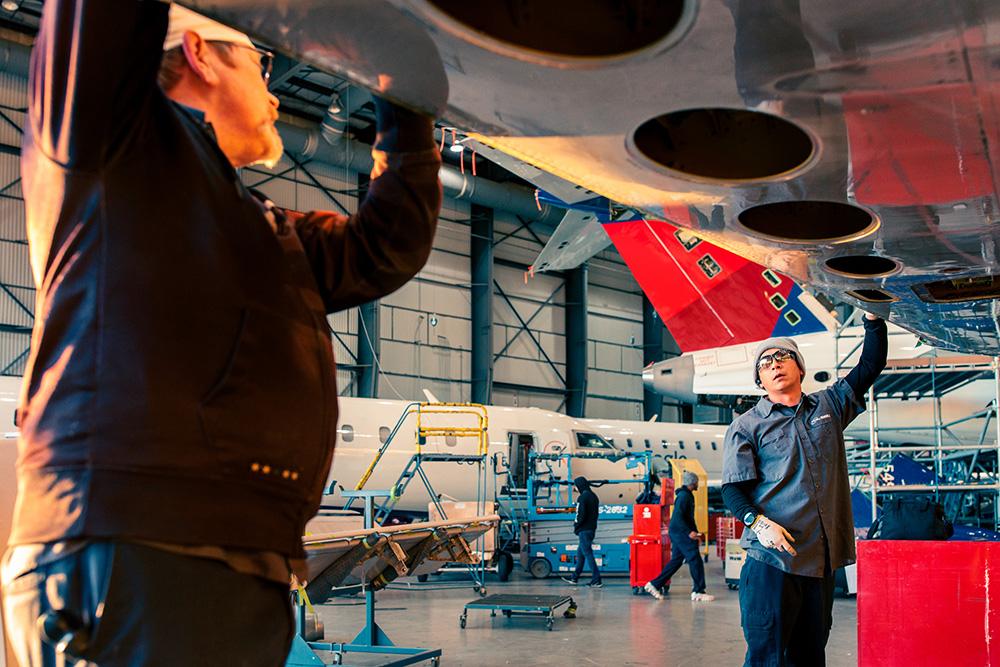
MHIRJ is launching new initiatives focused on supply chain, workforce and technology as it prepares for projected growth in the aftermarket, particularly on regional aircraft platforms.
According to Ismail Mokabel, MHIRJ’s senior vice president and head of aftermarket, “there is a little bit of a renaissance for the regional networks.” As the pilot shortage for regional carriers has started to stabilize, MHIRJ is seeing around 15% of Bombardier CRJ aircraft that were previously parked due to crew shortage issues coming back into service, which Mokabel says translates to an incremental 30% utilization on the CRJ fleet.
“The pendulum shifts now from crew availability into the ability of the supply chain at large and MRO to react to the pent-up demand that is created from some curtailment of maintenance that happened during the pilot shortage and organic demand coming from the increase in utilization and more aircraft [leaving] storage,” says Mokabel. Coupled with projected growth over the next three years, he says this has driven MHIRJ “to think a little bit differently about how we can grow faster in support of all services.”
On the supply chain side, MHIRJ is preparing to launch operations at a new distribution center near Dallas-Fort Worth International Airport in May. Operated in partnership with Kuehne+Nagel, the facility will support MHIRJ’s spare parts operations. Mokabel says the 110,000 ft.2 facility will utilize Lean principles to ensure maximum efficiency.
In May, the MRO services provider will also launch a new workforce pipeline program called MHIRJ Academy. Although the company has improved employee retention and recruitment through an overhaul of its compensation structure, Mokabel says this was “not enough for the growth trajectory that is coming our way, and that’s why we had to pivot into now being part of the solution versus just effectively competing in a constrained market.”
Based at MHIRJ’s Bridgeport, West Virginia facility, the academy is aimed at helping people with technical skills from other industries, such as automotive or oil and gas, make the transition into aviation. “One of the barriers to entry that we found is a lot of folks that do have a technical inclination were not able to get into aviation because of the cost and timing required for them to get trained without having a job,” says Mokabel.
The tuition-free, eight-week program provides technical training for aviation sheet metal, during which participants also get paid. “This is important for West Virginia because we are taking people who are under- and unemployed and bringing them into our facility, giving them good training so that they’ll have a good, stable career moving forward,” says Ross Mitchell, MHIRJ’s vice president of business development, marketing, communications and business operations.
If participants in MHIRJ Academy pass all course requirements, they are offered a job with the company at the end of the program. The first cohort of 20 students begins MHIRJ Academy on May 6 and the company expects to have trained around 100 people by the end of 2025. Mitchell notes that MHIRJ is looking at ways to expand the program to its Tucson Service Center.
MHIRJ is also focused on how to leverage artificial intelligence (AI) to increase efficiencies throughout its technical operations. Mokabel says the company is “in the beginning of this journey,” but it is considering how AI could be used in a variety of areas, including: planning for spare parts, used parts and repairs; giving technicians access to AI at their fingertips to solve queries; improving efficiency of administrative tasks to help the company scale in a cost-effective way; and using AI to assist employees managing customer-facing technicial helpdesk inquiries faster.
“Our phase one is really focused on the technical helpdesk and how we can help our people triage faster, provide service to our customer base and enhance the scalability, given the needs from the market. Then we’re going to be moving throughout the year and next year with other phases of that AI journey,” says Mokabel.





